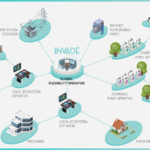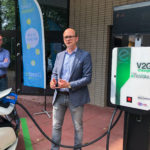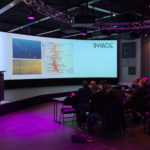#REMforum 2017: Reflections and Random Thoughts
By Heidi Tuiskula, Smart Innovation Norway 26. May 2017
Smart Innovation Norway (SIN) participated in The 8th St. Gallen Forum for Management of Renewable Energies on May 11th and 12th, representing the two Horizon 2020 projects SIN coordinates, namely EMPOWER and INVADE.
The annual event was organised by SIN’s collaboration partner, University of St. Gallen, in Switzerland. During the gala dinner on May 11th we heard a speech by Prof. Dr. Dana R. Fisher from the University of Maryland with the title “The Outlook for Progressive Climate and Energy Policies in a Polarized Political Arena”.
The speech explained the political background for attitudes against the climate change in the USA. We also heard some juicy rumors saying Trump might be willing to support carbon tax to collect money for the wall. You know what wall we are talking about …
Relevant to INVADE
Though climate change is urgent, renewables are cheaper than ever and cheap capital is abundant, we are still in a fierce battle AGAINST energy transition. On May 12th, the day started with a vote to answer why. According to the #REMforum participants, lack of political leadership is still the main barrier for energy transition.
 After the vote, Prof. Dr. Rolf Wüstenhagen from the University of St. Gallen showed the audience the full picture of drivers behind energy transition. This made me think: “This is exactly what we are focusing on in the INVADE project”!
After the vote, Prof. Dr. Rolf Wüstenhagen from the University of St. Gallen showed the audience the full picture of drivers behind energy transition. This made me think: “This is exactly what we are focusing on in the INVADE project”!
Risky business
“kWh not used is the most sustainable kWh”.
These are just some of the words of wisdom that we heard at the #REMforum panel discussion, with the topic “Investing in Renewable Energies in a risky Policy Environment”. The Trump administration and Brexit were naturally the main topics of the discussion, but neither of those had purely negative influence in the investment sector. Brexit was actually seen as an enabler for small investors, as it might scare away big players.
Investors mentioned two enablers for increase in investments for renewables. Firstly, policy making should be both reliable and predictable. Secondly, developing countries providing huge investment potential should get their act together when it comes to human rights, corruption etc. According to Louise Wilson “renewables may become the second important asset class after real-estate in £100bn UK savings market”. Thus, the glass is rather half-full than empty, even in the risky policy environment.
New community models
Dr. Celine McInerney, University College Cork, Ireland, talked about Local Ownership and Community Finance for Renewable Energy Projects, starting with a dramatic view on two main barriers for achieving COP21 targets, namely the amount of money needed and lack of community buy-in. She presented some interesting considerations for designing community investment schemes, starting from how the community is defined to taxation, risks and finally, skills in the community.
She also described different structures for community participation, including different levels of ownership. Throughout her presentation, the clear message was: The old utility model is being replaced with new community models. And again, I felt we were going in the direction of the INVADE project – within the business model development.
Next Simon Ryser from Schneider Electric was on stage talking about Energy Storage and Smart Grid Solutions. Ryser painted the future’s energy landscape as more decentralized, decarbonized, digitalized and more electric. The topic was well connected to the work and role Schneider Electric Norway has in the INVADE project as pilot integrator.
Attitudes towards renewable energy
The next talk introduced the main findings of the 7th Consumer Barometer of Renewable Energy. It showed that Swiss consumers continue to have very positive attitudes towards renewable energy. What I found even more interesting was that finally it is admitted that the framing of policy choices affects voting behavior.
After a networking lunch, we participated in the workshop “Business Models for local Flexibility co-creation”. From the brief introduction round, it was clear that business models related to energy transition interest a diverse group of experts.
 The Empower project and the local energy market model developed in the project were both central parts of the workshop. In addition to introductory talks, we got hands-on experience within business model development through group work.
The Empower project and the local energy market model developed in the project were both central parts of the workshop. In addition to introductory talks, we got hands-on experience within business model development through group work.
Discussion on gender differences
The final panel session at the #REMforum 2017 focused on Managing Diversity for a successful Energy Transition. It was truly different from anything I have seen in conferences before. For the first time, there was open discussion on generation gap, gender differences and other social aspects when it comes to energy transition.
In the end, the development of energy transition is depending on the acceptance of citizens around the world. Therefore, when I see a panel full of women, I am proud of my fellow science ladies for leading the energy transition from technical solutions into everyday life of citizens around the world.
Social media
INVADE updates

It is possible to control the speed of charging electric cars on a large scale with algorithms. This can be concluded from the results of a Smart Charging test on 700 public charging stations as part of the Horizon 2020 INVADE project. (4 years ago)

“I found the INVADE pilots incredibly interesting”
During the European Utility Week in Paris in November 2019, the INVADE project presented itself in a unique way in the EU Projects Zone. Using videos and an informative quiz, the INVADE stand was always busy. (4 years ago)

“Solutions like INVADE are necessary”
The Horizon 2020 INVADE project is coming to an end this year. Last week, a conference and a workshop were organized on behalf of the project and parallel to event Smart City Expo World Congress in Barcelona. (4 years ago)

The INVADE project has resulted in five successful pilot stories and professional films have been made from each pilot site. You can watch them all here. (4 years ago)

The work package WP9: Business models and market structures, led by INVADE project partner Lyse has put forward a market structure for platform-based business models inspired by disruptive companies like Amazon and Airbnb. (4 years ago)

In the end of May, the INVADE consortium was gathered in the Netherlands. During the two-day meeting, all five pilot owners presented their progress to the project partners. (4 years ago)

Badenova sells and operates networks, energy storages and smart city infrastructures in a region of nearly 1 million inhabitants and adapts INVADE technology and solutions on site for its customers. (5 years ago)

“We will act on everything we have heard today”
When Norway’s Standing Committee on Energy and the Environment visited Smart Innovation Norway headquarters in Halden on Monday, they were introduced to the company’s unique EU research expertise. (5 years ago)

Energy businesses that manage to incorporate total social impact into their activities, products, services, and communication to customers and employees, will have the best premises for future business growth – and for contributing to a better world. (5 years ago)

What is the added value?
In a few weeks the INVADE integrated platform will be up and running and the pilot owners are both hopeful and excited about what the results will show. (5 years ago)